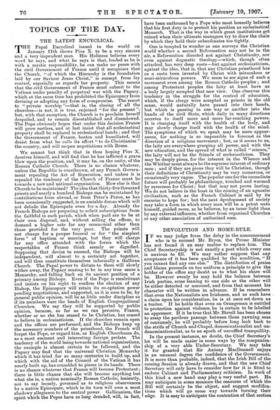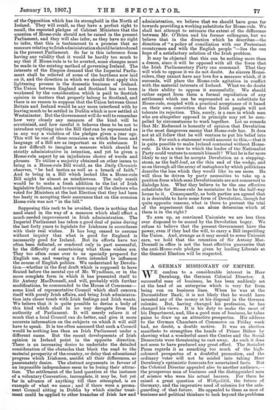DEVOLUTION AND HOME-RULE.
IF we may judge from the delay in the announcement who is to succeed Mr. Bryce, the Prime Minister has not found it an easy matter to replace him. The Chief Secretaryship is not exactly a post which every one is anxious to fill. We may rather suppose that any acceptance of it has been qualified by the condition, " If you cannot find any one else." The distribution of praise and blame proceeds on too uniform a principle to give the holder of the office any doubt as to what his share will be. However evenly he may hold the balance between Irish parties, some leaning to one side or the other will be either detected or assumed, and from that moment his character will be written in advance. If he remembers that even the Nationalists are Irishmen, and as such have a claim upon his consideration, he is at once set down as a traitor. If he holds that even an Orangeman is entitled to protection against violence, he is certain to be labelled an oppressor. If it be true that Mr. Birrell has been chosen to essay the perilous passage between these yawning seas of contumely, he will probably before long look back to the strife of Church and Chapel, denominationalist and un- denominationalist, as to an epoch of unruffled tranquillity.
In the present instance, no doubt, the Chief Secretary's lot will be made easier in some ways by the companion- ship of a very able Under-Secretary. We may take it for granted that Sir Antony MacDonnell enjoys in an unusual degree the confidence of the Government. It is more than probable, indeed, that the Irish Bill of the coming Session is already drawn, and that the new Chief Secretary will only have to consider how far it is fitted to endure Cabinet and Parliamentary criticism. In work of this kind a new hand may play a very useful part. He may anticipate in some measure tho censures of which the Bill will certainly be the object, and suggest modifica- tions which will go some way towards turning their edge. It is easy to anticipate the contention of that section of the Opposition which has its stronghold in the North of Ireland. They will recall, as they have a perfect right to recall, the repeated pledges of Cabinet Ministers that the question of Home-rule should not be raised in the present Parliament, and they will also infer, as they have no right to infer, that this is tantamount to a promise that no measure relating to Irish administration should be introduced in the present Parliament. So far is this inference from having any validity that it would be hardly too much to say that if Home-rule is to be averted, some changes must be made in the existing method of governing Ireland. The interests of the Empire demand that the Imperial Parlia- ment shall be relieved of some of the burthens now laid on it, and the direction in which we should first apply this lightening process is the domestic business of Ireland. The Union between England and Scotland has not been weakened by the consideration which is paid to Scottish opinion in matters that properly belong to Scotland, and there is no reason to.suppose that the-Union between Great Britain and Ireland would be any more interfered with by leaving much to be settled in Dublin which is now settled at Westminster. But the Government will'do well to remember how very closely any measure of the kind. will be scrutinised, and how careful it behoves them to be not to introduce anything into the Bill that can be represented as in any way a violation of the pledges given a year ago. This will be one of those occasions on which the form and language of a Bill are as important as its substance. It is not difficult to imagine a measure which should be strictly administrative in intention, and yet be given a Home-rule aspect by an injudicious choice of words and phrases. To utilise a majority obtained on other issues to bring in a Home-rule Bill would, as the Daily Chronicle observes, " be bad tactics as well as a breach of faith." And to bring in a Bill which looked like a Home-rule Bill might be almost as mischievous. The only result would be to make a fresh addition to the list of Irish legislative failures, and to convince many of the electors who voted for Ministers at the last Election that they had been too hasty in accepting their assurance that on this occasion Home-rule was not " in the bill."
Supposing this rock to be avoided, there is nothing that need stand in the way of a measure which shall effect a much-needed improvement in Irish administration. The Imperial Parliament has taken a good deal of pains during the last forty years to legislate for Irishmen in accordance with their real wishes. It has long ceased to assume without inquiry that what is good for England is necessarily good for Ireland. But its efforts have too often been defeated, or rendered only in part successful, by the difficulty of ascertaining what those wishes are. They too often come over to us specially prepared for English use, and wearing a form intended to influence the course of English politics. We understand by Devolu- tion—whether in the first draft which is supposed to have floated before the mental eye of Mr. Wyndham, or in the more complete form in which it has presented itself to Sir Antony MacDonnell, and will, probably with further modifications, be commended to the House of Commons— some kind of representative Council which shall concern itself with purely Irish affairs, and bring Irish administra- tion into closer touch witkIrish feelings and Irish wants. We believe that it is quite possible to devise a body of this kind which shall in no way derogate from the authority of Parliament. It will merely relieve it of much that a local Council can do better, and give it more accurate information on the subjects on which it will still have to speak. It is too often assumed that such a Council would be nothing less than an Irish Parliament under a different name. But the recent developments of Irish opinion in Ireland point in the opposite direction. There is an increasing desire to undertake the detailed consideration of the obstacles that block the road to the material prosperity of the country, or delay that educational ' progress which Irishmen, amidst all their differences, so passionately desire. The abstract arguments in favour of an impossible independence seem to be losing their attrac- tion. The settlement of the land question at the instance of a voluntary Convention, incomplete, it may be, but yet far in advance of anything till then attempted, is an example of what we mean ; and if there were a perma- nent Council sitting in Dublin by which similar treat- ment could be applied to other branches of Irish law and administration, we believe that we should have gone far towards providing a working substitute for Home-rule. We shall not attempt to estimate the extent of the difference between Mr. O'Brien and his former colleagues, but we believe that in the direction which be describes—the direction of " a policy of conciliation with our Protestant countrymen and with the English people "—lies the one hope of a satisfactory solution of the Irish problem.
It may be objected that this can be nothing more than a dream, since it will be opposed with all the force that the Irish Parliamentary Party can command. That they will wish to oppose it we do not doubt. As sincere Home- rulers, they cannot have any love for a measure which, if it succeeds, will place the Home-rule agitation in conflict with the material interests of Ireland. What we do doubt is their ability to oppose it successfully. We should rather expect from them a formal repudiation of any settlement which can be represented as a substitute for Home-rule, coupled with a practical acceptance of it based on their own conviction that the Irish people will not tolerate its rejection. This, surely, is a case in which men who are altogether opposed in principle may yet be com- pelled by circumstances to work together. Let us concede that Mr. Redmond is honestly of opinion that Devolution is the most dangerous enemy that Home-rule has. It does not at all follow that he will venture to put his belief into words. For such a statement would amount to this,—that it is quite possible to make Ireland contented without Home- rule. Is this a view to which the leader of the Nationalist Party could venture to commit himself? What he is far more likely to say is that he accepts Devolution as a stepping- stone, as the half-loaf, as the thin end of the wedge, and so on through all the array of metaphors by which politicians describe the less which they would like to see more. He will thus be driven by party necessities to take up a position from which sane Devolutionists are not concerned to dislodge him. What they believe to be the one effective substitute for Home-rule he maintains to be the half-way house to it. Consequently, as both parties are agreed that it is desirable to have some form of Devolution, though for quite opposite reasons, what is there to prevent the trial of the experiment that can alone determine which of them is in the right ?
To suns up, as convinced Unionists we are less than ever disposed to be scared by the Devolution bogey. We refuse to believe that the present Government have the power, even if they had the will, to carry a Bill imperilling the Union. And, strange as it may sound to some Unionist ears, we hold that the retention of Sir Antony Mac- Donnell in office is not the least effective guarantee that the anti-Home-rule pledges given by leading Liberals at the General Election will be respected.







































 Previous page
Previous page